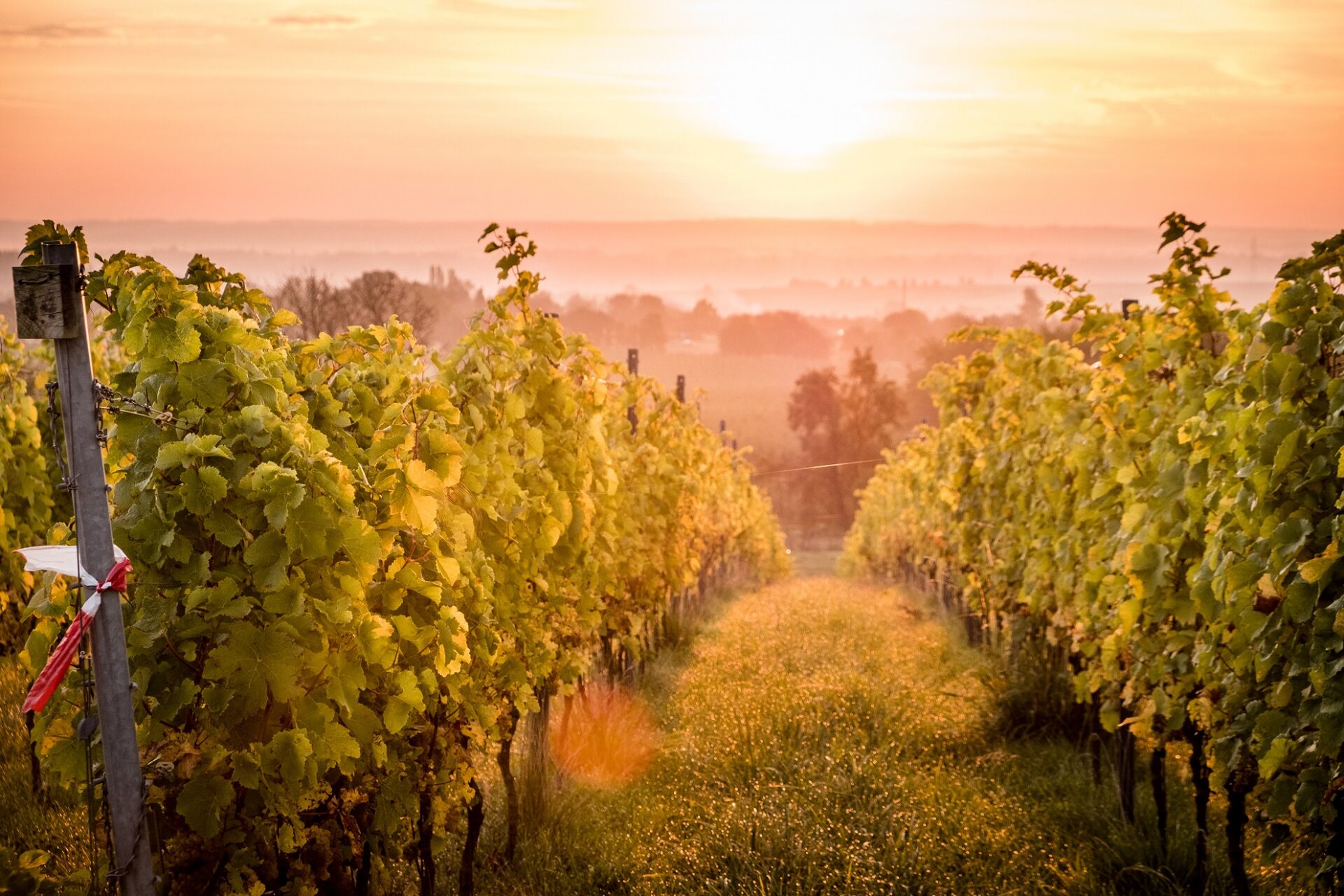Winemakers across northern Europe have had a rough couple of years. They have dealt with everything from floods to spring frosts to alternating bouts of heavy rains and drought and hail and destructive mildew. French winemakers took such a hit – production down 27 percent from the year before in 2021 – that the country last year slipped to third place among Europe’s biggest wine producers behind Italy and Spain. This year’s harvest was the earliest ever because of widespread drought.
Belgian winemakers, however, face a different challenge. They cannot produce enough to meet the surging demand for wines, especially if they are organic. “We sell most of our production way before the harvest,” says Pierre-Marie Despatures, who, together with his brother Jean-Bernard Despatures, runs the 100 percent organic winery Domaine Viticole du Chenoy in La Bruyère near Namur. They keep enough cases in reserve to serve guests, but recently had to tell a visitor that they had no bottles of their signature white wine, Citadelle, left to taste – and would not have any for another six months. “You’ll have to wait until next spring, when this year’s vintage goes on sale,” he said.
Of course, when it comes to beverages, Belgium is best known for its beer. But it is fast gaining respect among wine lovers for producing world-class and often highly original wines.
Outside Belgium, most people’s attention has focused on recent wine prizes won by Chant d’Eole and Ruffus – Belgian sparkling wines that imitate the typical yeasty, citric notes of famous French Champagnes. Most Belgian wine is still made from Chardonnay and Pinot Noir, which are among the best-known French grape varieties, and the Belgian wine market is totally dominated by French wine and therefore French grape varieties. Supermarket chains Carrefour, Colruyt, Cora and Delhaize have entire aisles of French wine, often with whole sections for each different region of France. Wines from the rest of the world – and the more than 10,000 grape varieties that they are made from – are usually relegated to smaller selections of ‘international’ wines.
But the most interesting development in the Belgian wine world today is the runaway success of homegrown wines that eschew the traditional French grape varietals for lesser-known varietals, such as TJohanniter, Helios, Bronner, Souvignier Gris, Rondo, Pinotin and Regent. “These new varietals give us the opportunity to create something really different, and not just be a copy of what happens in other countries,” says Eric Boschman, the country’s best-known wine critic and well-known entertainer. “The wineries that are working with the new grape varietals can’t produce enough of them.”
Hybrid grapes
More than a dozen Belgian wineries use only the newer varietals to produce their wines, while a few others use them in blends with better-known grape varieties.
The main reason is practical: the new varietals are naturally more resistant to two types of mildew that can wreak havoc with grapes. In a worst-case scenario, it can destroy an entire vintage. Moreover, the mildew is difficult to treat after it emerges, so most winemakers, including organic winemakers, spray their vines with fungicides 10-12 times a year to prevent the formation of the mildew in the first place (organic winemakers cannot use synthetic pesticides, but can use natural alternatives such as copper sulphate). But that means more work, higher fuel consumption and higher CO2 emissions – all at a time of growing consumer aversion to pesticides and rising energy prices.
With the new hybrids, winemakers can cut pesticide use in half or more – a godsend for organic and biodynamic winemakers who want to avoid using pesticides as much as possible. “I love them. I prefer them,” says winemaker Gerry Calders at Wijndomein Petrushoeve in the Flemish Hageland. “The future is hybrids.” All 12 hectares of the Petrushoeve domain are planted with new varietals, including Johanniter and Souvignier Gris. They produce some delicious and award-winning wines, such as Domaine du Chenoy, which he sells quickly, like most of his wines.
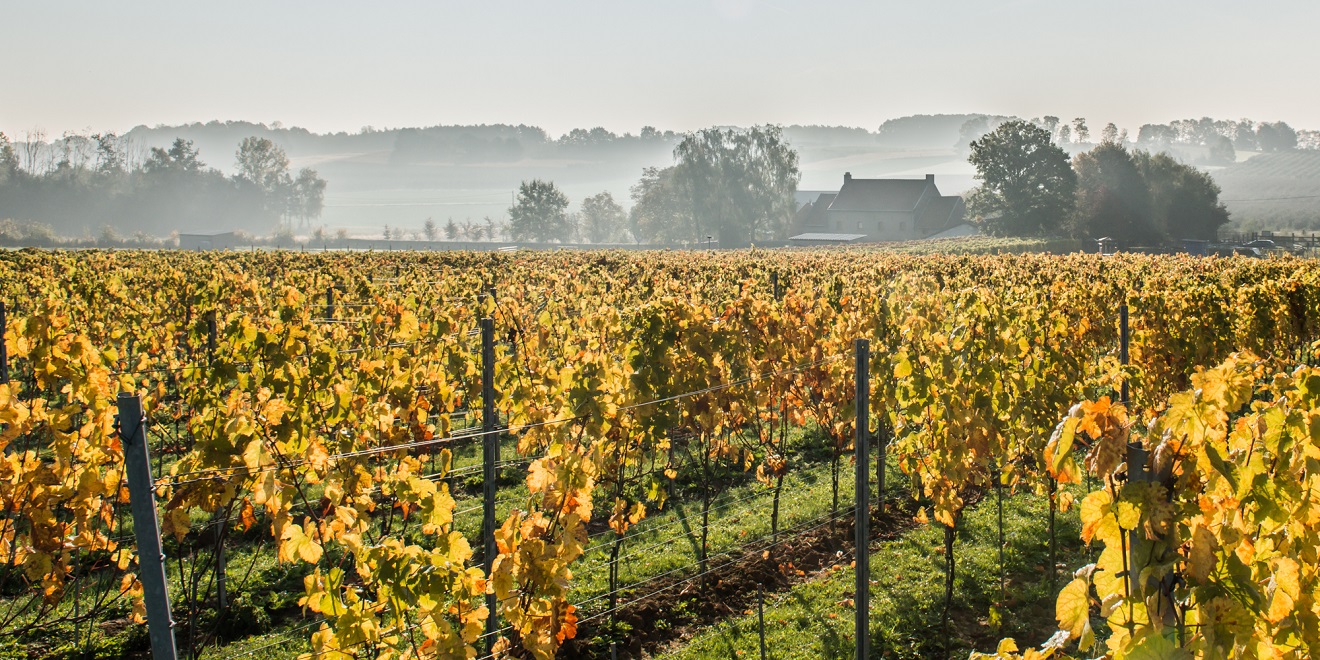
Wijndomein Petrushoeve
It’s no accident that the new varietals are fungus resistant. Belgium’s organic vintners are reaping the result of decades of selective breeding in which the pollen of mildew-resistant grapes, including some wild grape varieties, was painstakingly applied to the flowers of traditional varieties. The resulting seeds were collected, planted, and crossed again and again until the resulting vines demonstrated both good potential for winemaking and good resistance to mildew. Souvignier Gris, for example, is a cross between Seyval blanc and Zähringer grapes – each of which are the result of several other crosses whose genetic heritage includes American and wild grape varieties.
Known as interspécifique varietals in French or PIWI in German (short for pilzwiderstandsfähig, or fungus-resistant), the varieties were originally developed in France at the end of the 19th century after successive waves of phylloxera, mildew and other pests decimated French wine production. France abandoned that research in 1935 when it decided to create traditional designations of origin for its wines and limit the grapes that could be used to produce them.
During its occupation of France in World War II, Germany collected the hybrid grapes that had not been destroyed and continued the research in Germany. Most of Belgium’s PIWI grapes, and those grown in Germany, Switzerland, Austria, Italy, Slovenia, the Netherlands, the Czech Republic, Bulgaria and even Norway, hark back to a handful of German and Swiss state-funded agricultural research organisations that understood the value of developing fungus-resistant varietals.
They were first popularised in Belgium by Philippe Grafé, a successful former Namur wine merchant who founded the Domaine du Chenoy in 2003 as a retirement project. Looking for something different from the French wines he had sold his whole life and intending to produce organic wine, he made 15 trips to Germany to taste wine made from PIWI grapes before convincing himself that they were worthy of risking his retirement savings on. “I didn’t want to copy what they did in France or Germany, I wanted to do something different,” he says.
Kings in the north
Other winemakers from Wallonia were quick to take notice. At Philippe Grafé’s urging, Vanessa Vaxelaire, who together with her husband Andy runs the winery at the imposing 11th century Château de Bioul, south of Namur, also travelled to Germany and came back converts to the PIWI cause. “We loved the northern character of these grapes,” she says. “We wanted to produce something with its own identity, like Swiss and Austrian wines.” The winery uses biodynamic techniques including fertiliser made from cow dung ‘dynamised’ in horns buried in the soil. They also play classical music in the wine cellar during the vinification process in the belief, which they’ve also researched, that the vibrations agitate the wine and its yeasts better than stirring the wine by hand.
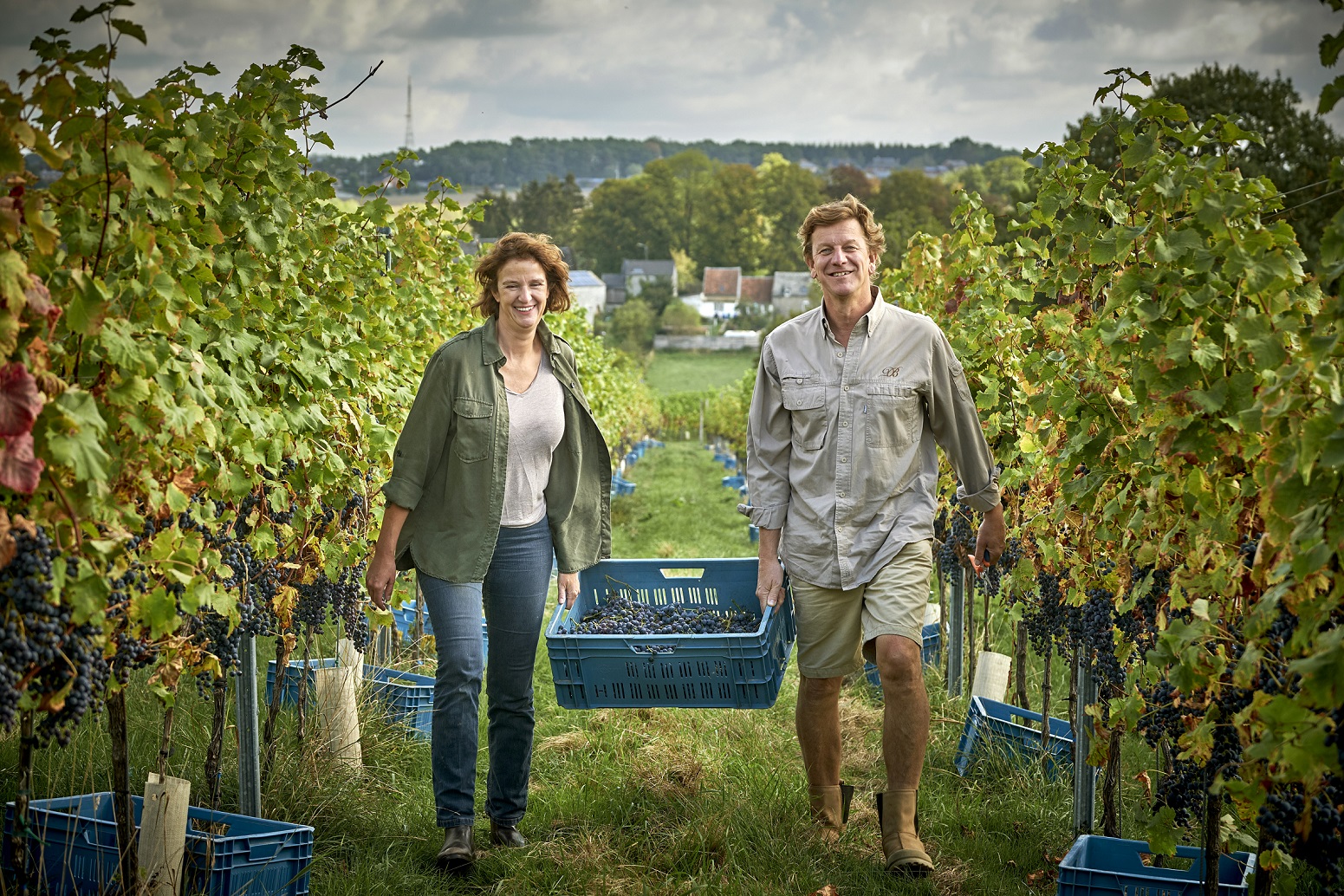
Andy and Vanessa Vaxelaire
Their bet paid off. The Vaxelaires began planting Pinotin, Solaris, Johanniter, Muscaris, Cabaret noir and Cabarnet Jura grapes in 2008 and never had mildew for the first 11 years. The last few years, however, have been more complicated because of frost and a bad case of mildew, but Mrs Vaxelaire said she has no regrets. “The Belgian market will lose everything if all we plant is Chardonnay and Pinot Noir,” she says. “We’ll be like Napa Valley, without any local character.”
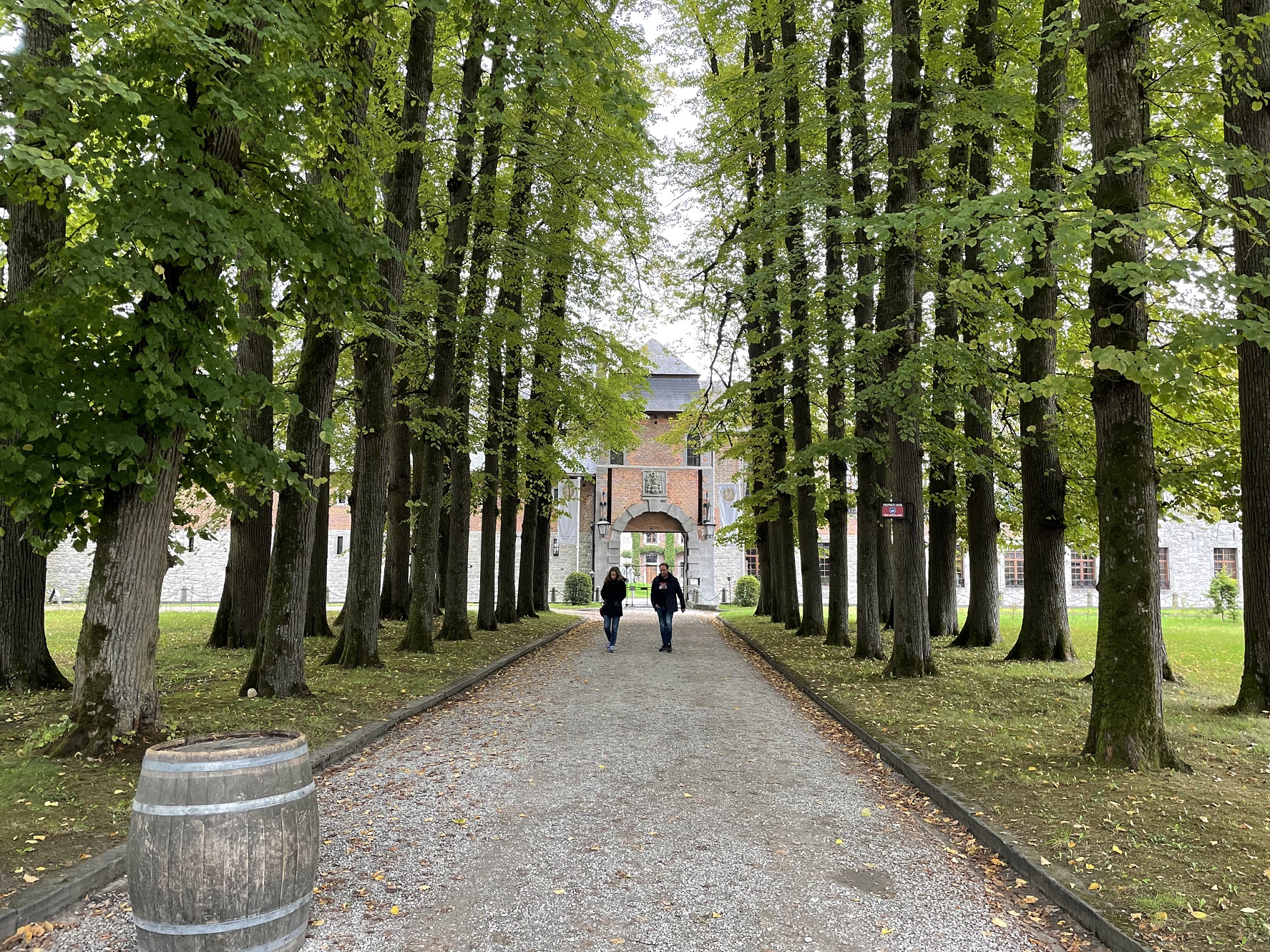
The entrance to the Château de Bioul
While Château de Bioul sells most of its wines to restaurants and wine stores, they keep about 25 percent for tasting and sale at the castle, which boasts a pleasant restaurant and a museum full of interesting exhibits about the castle, as well as winemaking in general. Their Brut des Houillères sparkling rosé, made from Pinotin grapes, had fine bubbles, apple and pear aromas, the taste of citrus peel and a long, zingy citric-cherry finish. Their two white wines made from Solaris, Johanniter and Muscaris grapes were also excellent. The white reserve had a subtle citrus and toasty nose with some banana aromas, followed by lemony, smoky, oaky and nutty notes in the mouth and a lemony, nutty finish.
While a few Flemish winemakers including Petrushoeve, 3 Fonteinen, Lijsternest and Klein Rijselhoek have adopted the new varietals and are beginning to make a name for themselves, Walloon winemakers were the first in Belgium to embrace them and remain at the vanguard of the trend.
Vin de Liège, a cooperative winery in the Basse-Meuse region near Liège, has been making wine from Johanniter, Souvignier Gris, Solaris and Muscaris grapes for 10 years. Alec Bol, who runs the winery’s day-to-day operations, says his parents only drank wine from Burgundy, but he knew that Chardonnay and Pinot Noir grapes demanded a lot of attention and were quick to fall prey to pests and funguses. “From the start, we’ve wanted Vin de Liège to be strong on sustainability,” he says, noting that the novel grape varietals not only require fewer pesticides but also ripen earlier, which helps to ensure a more stable harvest in the context of a changing climate.
Chateau Belge
Like the other wineries embracing the PIWI grapes, Vin de Liège started small and has steadily increased production year after year. Half of its production is sold to local restaurants, 40 percent to the partners of the cooperative and 10 per cent to organic stores. Most of its wines are blends of different new varietals, but its Ô de Craie white wine, which boasts smooth citrus and mineral notes, is made from 100 percent Johanniter grapes. Eric Boschman describes the wine as “gorgeous”.
The Despatures brothers took over the Domaine du Chenoy from Philippe Grafé in 2016. They added still white and red wines to a line-up which had previously focused on white and rosé sparkling wines and have also invested in new equipment and infrastructure to improve quality.
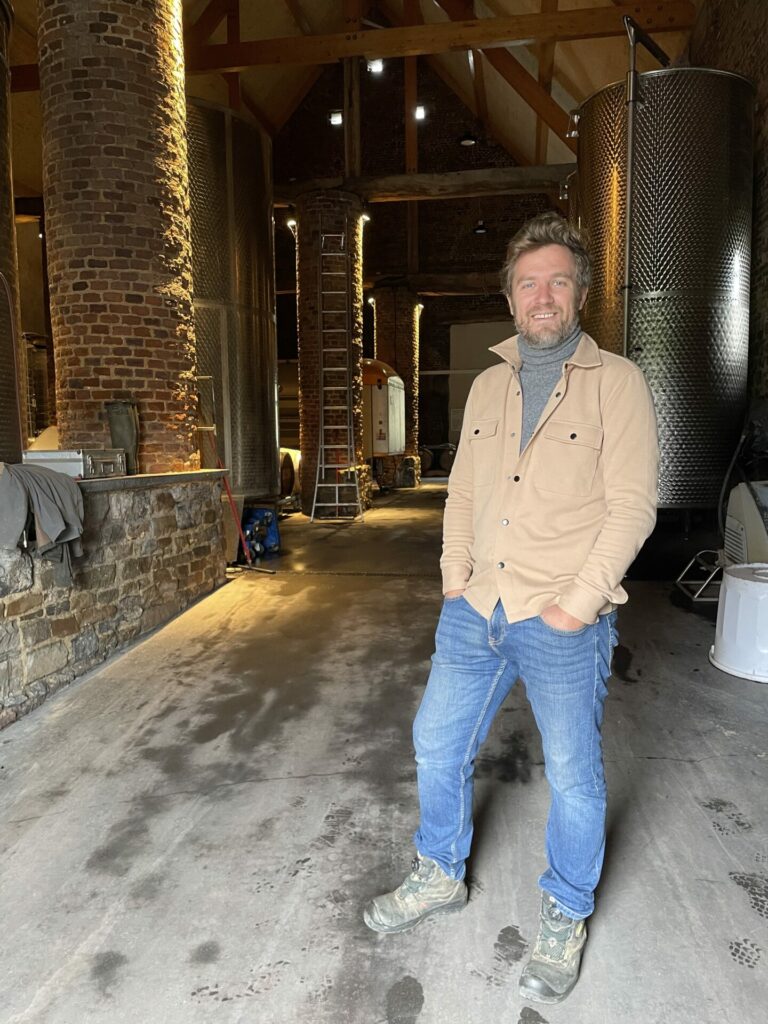
Pierre-Marie Despatures at Domaine du Chenoy
Pierre-Marie Despatures recently showed two visitors the winery’s new presses for crushing grapes, a procession of shiny stainless steel fermentation tanks bubbling with this year’s harvest, an impressive new ageing cellar lined with new oak barrels and a new vaulted tasting room for small groups who might feel lost in the huge tasting room next to the winery’s modest sales office. They were also building a large terrace overlooking the vines and looking for a cook to run a new on-site restaurant. After starting with 10 hectares, they are up to 15 hectares today and aiming to reach 20 hectares within a couple of years.
“Business is good,” Despatures says. The winery’s priority is to sell “good wine, not grape varieties,” he adds. The winery’s customers are 70 per cent from Wallonia, 20 percent from Brussels and 10 percent from Flanders. While the new varietals are mentioned on the winery’s website, its marketing is focused on labels that reflect local heritage and terroir: Citadelle (after the fortress in Namur), the Perle de Wallonie, Terra Nova and Grand Chenoy. The exception is its new rosé, Cupidon (sold out), which is made from a blend of Cabertin, Rondo and Regent grapes.
Chantal Samson, co-founder of the Popsss wine store near the Cimitière d’Ixelles, sells only wine made by Belgian winemakers. Although she also sells plenty of Chardonnays and Pinot Noirs, she says she is a fan of the wines with the new varietals. In addition to being greener by requiring fewer pesticides, she says the wines that use the new varietals are generally “a little less expensive” than wines made from traditional varieties. That is because winemakers pass on some of their savings on pesticides and fuel to consumers. That appeals to people who want to buy organic wine but don’t want to have to pay more for it.
More important, Samson says, is that the wines are Belgian, good and original. “They’re wines that reflect our terroir,” she says.

